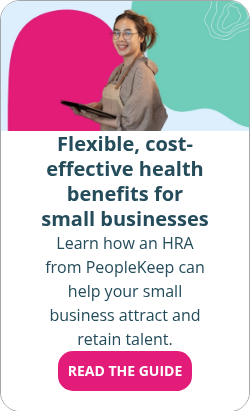HRA eligibility by type of business owner
By Elizabeth Walker on December 8, 2023 at 12:00 PM
Health reimbursement arrangements (HRAs) are a flexible and personalized way of offering health benefits to employees. But a common question we get from business owners is: “Can I also participate in my organization’s HRA as the owner?”
While offering an HRA is primarily about attracting and retaining talent by assisting employees with their healthcare needs, some business owners may be eligible to participate depending on their tax filing status and the type of organization they run.
Only W-2 employees can participate in an HRA. Therefore, an owner must be an employee to participate in their HRA. However, the IRS doesn’t consider the owners of many business entities to be employees.
This article reviews HRA owner participation rules for various owner types and entities so you can determine if they’ll work for your needs.
What is an HRA?
First, let’s briefly review how HRAs work. An HRA is an employer-sponsored health benefit allowing employers to reimburse their employees tax-free for more than 200 qualifying out-of-pocket medical expenses, including individual health insurance premiums.
With an HRA, employers choose how much monthly allowance to offer their employees. Once an employee determines how to spend that allowance and submits proof of an eligible expense, the employer reimburses them up to their set allowance amount. Unlike health savings accounts (HSAs), unused funds stay with the employer if the employee leaves the company.
Oftentimes, employers offer an HRA instead of a traditional group health plan to save on rising medical costs and give their employees greater control over how to utilize their health benefit.
Here are three types of HRAs that PeopleKeep offers:
- Qualified small employer HRA (QSEHRA): A QSEHRA is for small employers with fewer than 50 full-time equivalent employees (FTEs). With a QSHERA, employees can receive reimbursements for their individual health plan premiums and qualified out-of-pocket costs. QSEHRAs have maximum annual contribution limits set by the IRS.
- Individual coverage HRA (ICHRA): An ICHRA is for employers of all sizes and can be used to reimburse employees for their individual health insurance premiums and other out-of-pocket qualified expenses. It has no maximum contribution limits and allows employers to set different monthly allowances by specific employee classes.
- Group coverage HRA (GCHRA): A GCHRA, also known as an integrated HRA, supplements an employer-sponsored group health plan. Employees can use their allowance to pay for out-of-pocket medical costs their group plan doesn't fully cover, like deductibles and copays. Like ICHRAs, GCHRAs have no maximum contribution limits, and employers can set different allowances based on employee classes.
By offering an HRA, you’ll be able to meet every employee’s needs and stand out as an employer of choice—even if you’re a small employer with a limited health benefits budget.
What expenses qualify for reimbursement under an HRA?
HRAs can reimburse any eligible expense under IRS Section 213(d) of the Internal Revenue Code, listed in IRS Publication 5021.
The following are some popular eligible items for reimbursement with HRA funds:
- Over-the-counter medicine
- Dental expenses
- Vision expenses
- Prescription drugs
- Physical therapy and occupational therapy
- Contact lenses
- Monthly premiums
Different HRAs may restrict reimbursement for particular items. Additionally, the employer offering the HRA can choose to eliminate items from eligibility. For example, many businesses provide a premium-only HRA, which only reimburses insurance premiums.
Now that you have more details about how HRAs function, we’ll review how they work with different business owner types in the sections below.
C-corporation owners
Under U.S. federal income tax law, a C corporation (C corp) is any corporation that the IRS taxes separately from its owner or owners. C corporations are legal entities separate from the owner. This means the federal government considers C corp owners common-law employees of the corporation. Therefore, if you’re a C corp owner, you’re eligible to participate in an HRA.
The C corp owner’s family members are also eligible to receive reimbursements from the HRA. As with all eligible participants, reimbursements for the C corp owner and the owner’s family are tax-free.
S-corporation owners
An S corporation (S corp) is a special type of corporation you can create through an IRS tax election. S corporations aren’t subject to corporate income tax. Instead, the IRS taxes shareholders who own more than 2% of the company's shares on an individual basis. That means the IRS doesn’t consider S corp owners as employees but as self-employed individuals.
Because only W-2 employees are eligible for an HRA and the IRS taxes S corp owners like shareholders, S corp owners and their families aren’t employees. Therefore, they aren’t allowed to participate in an HRA.
Some S corp owners want to participate in an HRA to track their expenses, but the IRS doesn’t permit this either. HRAs are a reimbursement benefit, and the IRS doesn’t consider reimbursed insurance policy premiums as “established by the business.”
This means S corp owners and their families can’t deduct those medical expenses even if they participate in the HRA for tracking purposes.
However, if you’re an S corp owner, you can write off your medical expenses in other ways. For example, you can take a personal income tax deduction for health insurance premiums the business pays for.
Additionally, S corp owners can still offer an HRA to non-owner employees. HRAs allow the corporation owner to have complete control over their budget while allowing employees to choose how they spend their healthcare allowance.
Partners
A partnership is a single business where two or more people share ownership. A partnership isn’t subject to income tax. Instead, the IRS directly taxes partners. That means the IRS considers partners self-employed and ineligible to participate in an HRA.
However, unlike S corp owners, partners can receive tax-free reimbursements if they’re married and their spouse is a regular W-2 employee of the organization with health insurance coverage that meets minimum essential coverage (MEC). In this case, the partner can set the HRA up in the spouse's name, and the partner can receive reimbursements as an eligible dependent.
Sole proprietors
A sole proprietorship is an unincorporated business owned and run by one individual, with no distinction between the business and the owner. The IRS doesn’t consider sole proprietors employees of their own companies. Because of this, they can’t directly participate in an HRA, as only W-2 employees are eligible for the benefit.
But if a sole proprietor employs their legal spouse as a W-2 employee at their business, they can indirectly take advantage of the HRA and receive health savings.
The spouse can cover the sole proprietor—and any eligible children—as dependents on the HRA and enable them to use their tax-advantaged allowance to purchase a health policy and medical services. As mentioned above, if the spouse has health insurance coverage that provides MEC, all HRA reimbursements are income tax-free for them, the sole proprietor, and other eligible dependents.
Conclusion
No matter what kind of business you run, offering a customizable health benefit is a great way to attract and retain your employees. If you're an owner who can't participate in an HRA, that doesn’t mean they aren’t a good choice for your overall company. HRAs help keep your employees healthy and happy by allowing them to purchase healthcare products and services that work best for them and their families.
If you’re interested in offering your employees an HRA, PeopleKeep can help! With our HRA administration software, you can design your benefit and manage your personalized health benefits in minutes each month.
This article was originally published on July 13, 2020. It was last updated on December 8, 2023.
Check out more resources
See these related articles

What employers need to know about HRA debit cards
Are you considering HRA debit cards for your workers? Find out why they may not be the best option for your company and what alternatives you can explore.

Does an HRA work with Medicaid?
Find out if an HRA can be used with Medicaid. Learn how HRA reimbursements work for employees enrolled in Medicaid and what limitations may apply.

HRAs and W-2 annual reporting
Learn about HRA W-2 annual reporting requirements. Understand what employers need to include on employees' W-2 forms for HRA compliance.



